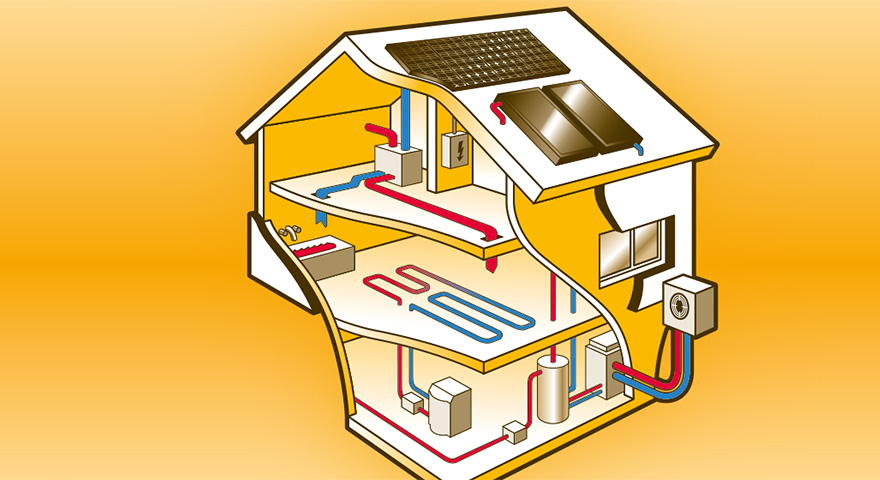Building owners have to attain specific energy standards to take advantage of grant programmes. Therefore components of modern efficiency houses aim at saving energy. Click on the icons above and learn more. (Illustration | ebm-papst, Gernot Walter)
For many years, energy efficiency was not a particularly important aspect in building construction. As a result of the specific construction methods and aesthetic preferences of past decades, older buildings are real energy hogs by today’s standards. Priorities have shifted, and today, increasing energy costs make household budgets tighter every year. The ever more clearly noticeable effects of climate change are prompting people to treat the environment more carefully. Those who are not motivated by these factors are constrained by the law in Germany and other countries to build in an energy-efficient manner. Just in 2009, the German federal government amended its Energy Savings Ordinance (EnEv), thus reducing the permitted annual energy consumption of a new building by 30 per cent compared to EnEv 2007. This means that only seven litres of heating oil may be used annually per square metre in a new building. The 30 per cent target also applies to renovations. By comparison, a typical single-family home from the 1970s requires some 20 litres of oil per square metre. Here, too, the initial impression confirms the conventional wisdom: The more environmentally friendly, the more expensive, which means substantially higher costs during construction. In a long-term view, however, this impression becomes more nuanced. Depending on future energy prices, the construction costs are amortised over the years and then lead to effective savings. To provide additional motivation for building owners to choose energy-efficient construction, the German government offers a wide variety of grant programmes. Chief among these is the KfW Bankengruppe (banking group), which is owned by the government.
The right grant programme for your new building
The grant programmes of the KfW serve as the general guideline for the energy performance level of all planned housing starts. According to this guideline, only houses that meet the criteria of a passive house or high-efficiency house qualify for grants. The latter type of house exists in three variants: 70, 55 and 40. In this case, less really is more, as a lower number corresponds to a higher subsidy level (see information box). The background for these numbers is the fact that the high-efficiency house uses 55 per cent of the energy required by what is called a standard house. This is made possible by modern heat insulation and heating systems with renewable energies. Depending on the type of heat pump (see graphic above), axial or centrifugal fans from ebm-papst can ensure optimal flow of air through the heat exchangers.
The passive house embodies a slightly different concept. Even more effective insulation makes it largely independent of the outside temperature. In a ventilation unit, a plate or rotating heat exchanger takes a large portion of the heat from the exhaust air flow and feeds it back into the air inflow. GreenTech EC centrifugal fans from ebm-papst enable operation that is not only energy-saving but also low-noise. This preheated fresh air, the body heat of the inhabitants and the heat energy of the household appliances allow the additional heat requirement to be extremely low, so that it can even be covered by natural energy sources such as solar radiation or geothermal heat. For both high-efficiency and passive houses, building owners benefit from a credit of up to 50,000 EUR with the KfW grant programmes. The interest and any loan repayment subsidies depend on the efficiency level attained.
High savings potential for those renovating buildings
 Those who renovate an existing building can select from several subsidy standards, as is the case for new construction (see information box). In most cases, this indeed pays off: “Builders are responding to the fact that their energy costs are hurting them,” relates Andreas Garscha of the VPB, a German developers’ association. “For example, when we renovate a poorly insulated roof, we lower the ongoing costs by a considerable amount for decades. In many cases, the renovation would pay for itself over the long term even without the additional subsidy.” In addition to the significantly lower energy costs, other benefits include decreased mould growth and improved noise control. This not only makes the building a comfortable place to live, the increase in its value should not be overlooked as an incentive to renovate for greater energy efficiency. The basic prerequisite for the subsidies is a complete renovation carried out by a professional contractor.
Those who renovate an existing building can select from several subsidy standards, as is the case for new construction (see information box). In most cases, this indeed pays off: “Builders are responding to the fact that their energy costs are hurting them,” relates Andreas Garscha of the VPB, a German developers’ association. “For example, when we renovate a poorly insulated roof, we lower the ongoing costs by a considerable amount for decades. In many cases, the renovation would pay for itself over the long term even without the additional subsidy.” In addition to the significantly lower energy costs, other benefits include decreased mould growth and improved noise control. This not only makes the building a comfortable place to live, the increase in its value should not be overlooked as an incentive to renovate for greater energy efficiency. The basic prerequisite for the subsidies is a complete renovation carried out by a professional contractor.
A question of attitude
Especially when planning a housing start, the homeowner should consider how important energy efficiency is for him or her. “no one should decide in favour of a higher efficiency level based on financial incentives alone,” recommends Garscha. “The savings do not increase in a linear fashion, but rather diminish compared to the greater one-time cost.” In any case, it is advisable to work with an independent consultant; indeed, for higher subsidy levels, this is mandatory. In any case, in Germany, the deliberations should take into account the fact that in addition to the grant programmes from the German federal government and states, some municipalities also provide support for energy efficiency-related construction and renovation projects. Research carried out in a timely manner is always recommended. After all, the programmes all have one thing in common: they are constantly changing. New programmes are added, while others are discontinued. This is another reason why building owners and renovators should not wait too long. Moreover, the German federal government has announced that it will cut its grants in half in 2011 as part of budget cuts.
Energy efficiency worldwide
Energy-efficient homebuilding is becoming increasingly important on an international level as well. However, different countries have very different approaches to the topic.
 USA: The government’s “Energy Star” initiative supports homebuilders and renovators in their projects by providing support in planning and, above all, credit incentives.
USA: The government’s “Energy Star” initiative supports homebuilders and renovators in their projects by providing support in planning and, above all, credit incentives.
www.energystar.gov
 Great Britain: The independent “Energy Saving Trust” organisation provides advice and information free of charge. An extensive database provides information about the grant programmes, which differ widely from region to region.
Great Britain: The independent “Energy Saving Trust” organisation provides advice and information free of charge. An extensive database provides information about the grant programmes, which differ widely from region to region.
www.energysavingtrust.org.uk
 Japan: The Ministry of Economy, Trade and Industry rewards Japanese residential builders for energy-efficient measures with “eco-points”, which they can redeem for goods and services.
Japan: The Ministry of Economy, Trade and Industry rewards Japanese residential builders for energy-efficient measures with “eco-points”, which they can redeem for goods and services.
www.meti.go.jp
 China: Though government subsidies for energy-efficient housing construction are not provided, government regulations to this effect are in place. The provisions vary greatly between regions. A good overview of some of the regulations is provided by the national energy savings association, CnGBn.
China: Though government subsidies for energy-efficient housing construction are not provided, government regulations to this effect are in place. The provisions vary greatly between regions. A good overview of some of the regulations is provided by the national energy savings association, CnGBn.
www.cngbn.com
Subsidy levels of the Kreditanstalt für Wiederaufbau (KfW)
In Germany, the KfW supports energy-conscious property owners with interest rate credits, both during new construction and renovation. Those who attain the energy standard of a KfW efficiency house obtain an additional repayment subsidy. The number behind the high-efficiency house specifieshow high the annual primary energy requirement is compared to the legal regulations. The KfW high-efficiency house 70 thus corresponds to 70 per cent.



i’m going to prepare new energy affic. school building. if you have share ideas with me. +91 9374011004